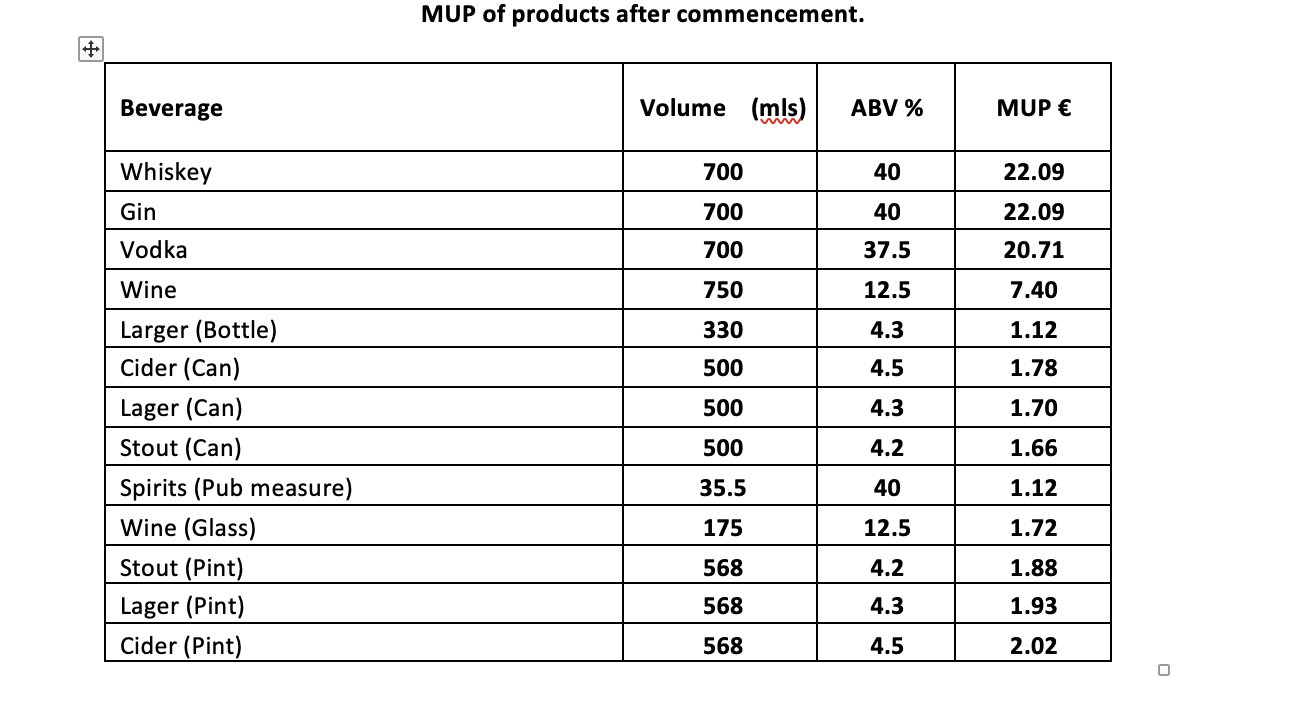MINIMUM UNIT PRICING OF ALCOHOL SET TO COMMENCE IN JANUARY 2022
The Minimum Unit Pricing of alcohol (“MUP”) was officially launched by the Minister for Health this week and is intended to commence in January 2022.
This latest provision comes as the third major change for the retail industry, following the introduction of structural separation in November 2020 and the changes to alcohol promotions and loyalty schemes at the beginning of the year. The above links provide more detailed information on the impact the new laws have on the retail industry.
What is MUP?
MUP sets a minimum price under which alcohol cannot be legally sold. This price is based on how many grams of alcohol a product contains i.e. the higher the alcoholic strength the more expensive the alcohol will be.
The minimum price is calculated using the following formula:
A x B = C
where—
A is the minimum price per gram of alcohol,
B is the quantity in grams of alcohol contained in the alcohol product, and
C is the minimum price of the alcohol product expressed in euro and cent.
The below chart gives an example of the floor price for a range of alcohol products.
What impact will MUP have on Retailers?
Off Licences, supermarkets and convenience stores will no longer be able to sell alcohol for a price below the minimum unit price stated above.
Retailers need to be careful that they have accurately calculated the MUP for each alcohol product sold. Many supermarkets sell specialised beers and ciders which may have different mls to the standard 500ml can or 330ml bottles.
What impact will MUP have on hotels, pubs and restaurants?
Although the section does apply to On-Licences, the majority of hotels, pubs and restaurants already sell spirits, wine and pints above the proposed minimum unit price and for those premises their prices will largely not be affected. However, they should be careful when carrying out any off sales to ensure the transaction is above the minimum unit price.
Does MUP apply to wholesale sales?
No, MUP does not apply to wholesale sales. As a result, the holder of a wholesale spirit, beer or wine licence will be able to sell alcohol below the minimum set price, provided the sale is in wholesale quantities.
A wholesale spirit, beer or wine licence allows you to sell in the following quantities:-
– A spirit wholesale dealer’s licence allows you to sell not less than 9.092 litres.
– A wine wholesale dealer’s licence allows you to sell not less than 9.092 litres.
– A beer wholesale dealer’s licence allows you to sell both beer and cider in quantities not less than 20.457 litres.
However, any wholesalers who also hold retail off licences and carry out sales in retail quantities must ensure those transactions do not fall below the permitted MUP.
Does MUP apply to duty free?
No, MUP does not apply to alcohol sold in duty/tax free, so travellers abroad will be inclined to stock up on alcohol products.
Are Northern Ireland also implementing MUP?
Originally, there was hope that MUP would be introduced in both Northern Ireland and the Republic to prevent market distortions in either jurisdiction, but this has not been achieved. It is understood that MUP will not take effect in Northern Ireland until at least 2023.
Retailers are concerned that the differences in prices across the border will impact trade not only for alcohol off sales but for the retail trade as a whole.
What are the penalties for breaching the MUP provisions?
A person who sells alcohol or promotes the sale of alcohol at a price that is below the minimum price for that product, shall be guilty of an offence which is punishable on conviction to a fine of up to €250,000 and/or imprisonment of up to 3 years.
It may be a defence under the Act for those facing prosecution to claim that they have made ‘all reasonable efforts to ensure compliance’ to comply with the provisions of the Act. Staff should be fully trained in relation to the MUP to ensure that all alcohol for sale meets the threshold and to avoid any oversights relating to offers etc.
What should Retailers do next?
In order to prepare for January 2022, retailers should review their current alcohol pricing structure and prepare to make the necessary changes on the shop floor and on their EPOS systems.
If you wish to discuss any of the above in more detail, please do not hesitate to contact one of our licensing team who will be happy to assist you.
Compton Solicitors will continue to provide updates on the remainder of the regulations that are yet to commence under the Public Health (Alcohol) Act 2018.
This document is intended to provide a general overview and guidance on a particular topic. It is provided wholly without any liability or responsibility on the part of Compton Solicitors and does not replace the necessity to obtain specific legal advice.
Please contact Lorraine Compton or Fiona Tonge for more information: –
• Lorraine Compton on 086 – 253 4651 or
lorraine.compton@comptonsolicitors.ie
• Fiona Tonge on 089 – 471 4128 or
fiona.tonge@comptonsolicitors.ie
We Can Help You To Better Understand What Business You Can Carry Out During The Covid 19 Emergency Period:
Liquor Licensing is a complex and multi faceted process.
We pride ourselves on providing a simple, non technical road map with a speedy timeline for completion of the project. Along the way, we will liaise directly with architects and accountants to leave you free to concentrate on your business.

